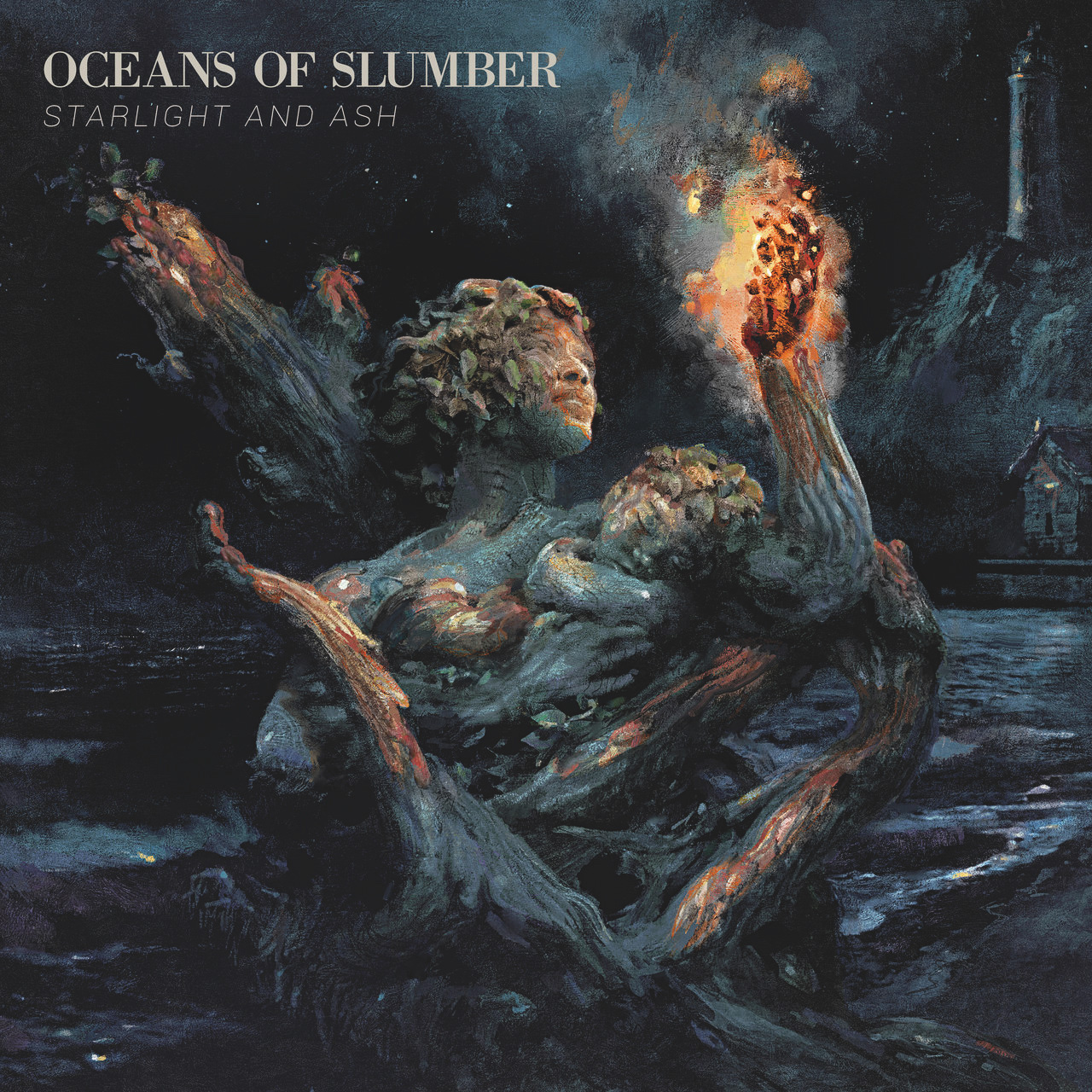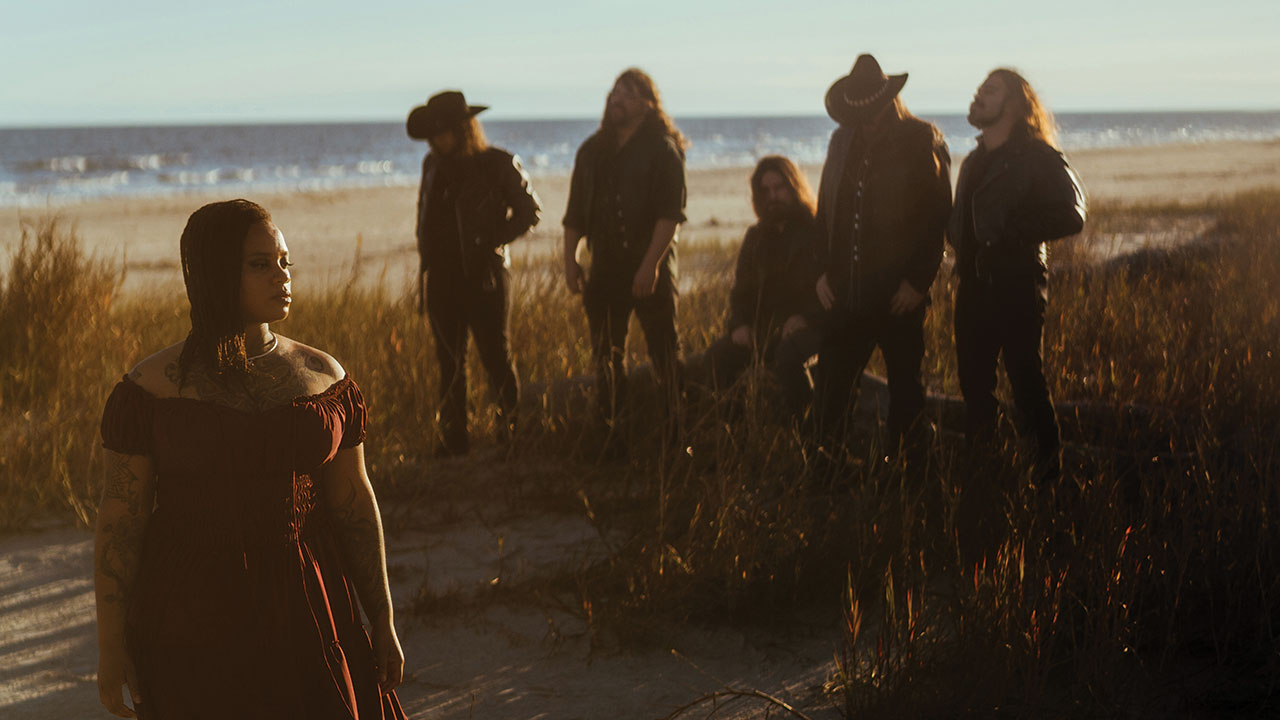
“Sorry, I’m gonna yell at my cat real quick,” Cammie Beverly apologises. The vocalist of Texan progressive metal idols Oceans Of Slumber is sat in her living room in Houston, and her one-year-old feline is destroying her curtains. “She’s a rescue from my husband’s family land, so she’s a farm cat. And she’s psychotic.”
It’s refreshing seeing Cammie struggle with something so ordinary as she joins Prog on a Zoom call. Even if you only know her through her singing, her voice is strikingly and consistently extraordinary. Stick on Oceans Of Slumber’s new album, Starlight And Ash, and you’ll find 11 songs driven by her pipes, which are clear and powerful, yet adorned with an unmistakable Deep South smoothness. They’re the vocal equivalent of sinking yourself into a hot bubble bath, or enjoying a relaxing massage.
From opener The Waters Rising, the listener is ensnared. The ballad begins with Cammie crooning over keys and simple percussion. However, it escalates to barrelling drum smacks and shouts that, though authoritative, do nothing to dampen the beauty of the singer’s voice. Follow-up Hearts Of Stone casts her on top of bubbling synths, while Salvation incorporates a blues twang into their canon.

Cammie’s vocals have always been one of Oceans’ prime USPs. In their review of 2020’s Oceans Of Slumber album, Prog’s sister magazine Metal Hammer commented: “[Beverly’s] charismatic presence and rich, soulful voice leading the charge”. This is in spite of the band, up until now, penning twisted progressive metal giants, comparable in scope to Opeth. In stark contrast, Starlight… has what Cammie calls “singer-songwriter vibes”: its tracks are episodic and direct, progressive in their eclecticism rather than in grandeur. It was a switch driven by the band’s drummer and creative leader, as well as Cammie’s husband, Dobber Beverly.
“Dobber took the reviews to heart,” Cammie remembers, “and he obviously loves my voice. It’s always been a prominent feature, but on this album we wanted to put it front and centre. I think these songs were written with my voice in mind first, rather than, ‘Oh, we have this great music – now we need to put your voice over it.’”
Every track contributes something new to Starlight…, from the heavy metal bang of Star Altar to the string-powered folk rock cover of House Of The Rising Sun. However, according to Cammie, the heart of the album is its third song: the country-tinged and exclusively acoustic The Lighthouse.
She explains: “On The Lighthouse, I create my own religion. [In the song] the people of this town have a cult and a spiritual leaning towards worshipping this lighthouse. They’re like, ‘If we maintain the lighthouse – if we sacrifice all our blood, sweat and tears and keep it pristine – then that light cast over the ocean will make sure our sailors come home.’ As the listener, you know that that’s not how that works. Between storms and ships, there are so many variables that go into that. It’s a play on the asinine qualities that I see in religious people.”
Cammie has every right to be pissed off at religion. After all, she’s a Black woman living in Texas, where conservative Christians frequently use faith as an excuse to justify bigoted politics. The state governor is Greg Abbott: a white, cishet, Catholic, male Republican who’s openly anti-abortion and fought to prohibit same-sex marriage. In 2021, Dan Patrick, the evangelical lieutenant governor of Texas, blamed the then-rising number of Covid-19 cases in the United States on unvaccinated African-Americans – comments that were decried as racist.
“You drive around and there are billboards like, ‘Be saved!’ or ‘Have you prayed today?’” Cammie adds. “‘Life begins at first kiss’ – that kind of bullshit. We have people that spend all day standing outside, picketing and protesting free clinics, and it’s like, ‘You know they do other stuff in there, right? They’re not just giving people abortions all day.’ Texas is ‘God’s country’, so it’s intense, and Southern Christianity has always been a spectacle. We have cowboy churches and rattlesnake churches, and they’re their own cults.”

Cammie’s struggles with religion extend even beyond that backdrop, though. The singer was born on October 8, 1987. At the time, both of her parents were part of a religious organisation called the Institute Of Divine Metaphysical Research. Her dad – a musician with a long history of drug use – had been the choir director of the sect since the 1970s, when he met a member at a party and was enraptured by what they had to say. Her mum would attend gatherings until Cammie was eight years old; at that point, she defected and became a Jehovah’s Witness.
“It was a turbulent household,” Cammie remembers. “My mum, in finding religion, became pious: ‘I’m not gonna drink and I’m not gonna do drugs; I’m gonna live to the Bible’s standard.’ While there were a lot of attempts at sheltering me, there was a lot of exposure by default, because my dad was manic depressive. He had substance abuse issues. He was all over the place. Throw religion in on top of that and it makes for a unique, needs-to-go-to-therapy kind of person.”
It was a strict upbringing. Cammie wasn’t allowed to go to birthday or Christmas parties. Any film she wanted to watch or album she wanted to listen to had to be “screened”, with her parents disallowing anything taboo. It wasn’t until she turned 15 that life became less rigid – her dad was diagnosed with leukaemia, and the disease would take his life in 2014. “My mum and him were fully focused on his cancer treatment,” says Cammie. “I got to do whatever. By the time I was 16, I was all over the place; I got to come and go as I pleased.”
It was through this that she discovered music, sneaking off to go to Korn and Slipknot concerts. Soon after, she started making songs herself. Before Oceans Of Slumber, Cammie was the lead singer of a post-rock outfit called Miles To Glory. Their rehearsal space was next door to that of the singer’s future band, who at the time were fronted by Ronnie Gates.
“Ronnie asked me about doing a duet on [Oceans Of Slumber’s second album] Winter,” Cammie recalls. “Turpentine was the only song I was supposed to do. But Ronnie had a lot of extracurricular substances that he liked to do, and he disappeared. He was MIA, so Dobber asked me to join the band and re-record the vocals for Winter.” Cammie and Dobber started dating two years later, marrying in 2021.
Winter was released to critical acclaim in 2016, before The Banished Heart and Oceans Of Slumber followed to similar praise in 2018 and 2020, respectively. With Starlight And Ash introducing an entirely new musical era for the band, Cammie says that she wants the album “to solidify that we’re making our own space. We’re not trying to fit into any defined genre.”
She declares: “All we’re worried about is making good songs and good music that impacts people. How many artists are making music that just doesn’t sound like anything else? I feel like people stop trying. Look at Nick Cave. What is Nick Cave? He could tour with no one but himself, and that’s what we want.”
Listening to Starlight…, Prog can safely say: mission accomplished.
This article originally appeared in issue 132 of Prog Magazine, 2022.







